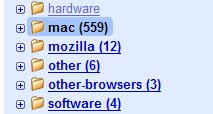Once upon a time there were no icons for feeds. Many sites used orange  icon which really made no sense to the average user (what’s xml?). Then there was a feed icon
icon which really made no sense to the average user (what’s xml?). Then there was a feed icon  . It then started to become a standard and webmasters were encouraged to adopt it. This was a great thing for users who want easy to find RSS feeds, and publishers who want users to easily find RSS feeds.
. It then started to become a standard and webmasters were encouraged to adopt it. This was a great thing for users who want easy to find RSS feeds, and publishers who want users to easily find RSS feeds.
Then the idea of an OPML icon. Now there’s the idea of a “Share This” icon and a Microsummary icon (which I could see being a standard as the feature is cool enough for adoption). Then there are MicroFormat Icons.
Standard icons are a good thing, they are one less thing a user has to learn to distinguish between sites/products. But I do wonder if there’s really a need for what seems to be a bunch of icons. My fear is that it will just become a rainbow of colored icons with simple shapes.
For the share icon you could of course question the sustainability of such “user generated content” or “social networking” sites, or just the need to launch into them. They aren’t standardized, a protocol, format, etc. We don’t have a specific icon for news, weather, blogs, or even somewhat standardized things like email or IM. Email and IM at least have some standards, even though IM isn’t shared across the board. There are trends for some of these that tend to be “universal symbols” such as a newspaper for news, envelope for mail, etc. But no standardized icon.
For microsummaries, and microformats, do we really expect users to directly interact with them? Or use them in a more subconscious fashion similar to the <title/> tag on a webpage.
I question how effective all the icons will really be to end users in the long run. I can see the feed icon persisting, since it’s represents two standards at the moment (RSS/Atom) that both do the same thing. Both the technology and the icons are well adopted to further solidify it’s status as a standard icon.
Is there a need for the rainbow?
I’m not accusing or criticizing, but wondering (out loud) what the likelihood of users recognizing all these square icons really is. Should there really be a “standard icon” for everything we do in Web 2.0 (as they call it)? Or should it be more informal like it is for email and news?
Should we have an icon to link (via anchor) to the part of your page where you show the various icons your site has? An icon-icon? Perhaps that’s worthy of a Photoshop contest.

 I don’t see any reference on their
I don’t see any reference on their  icon which really made no sense to the average user (what’s xml?). Then there was a
icon which really made no sense to the average user (what’s xml?). Then there was a